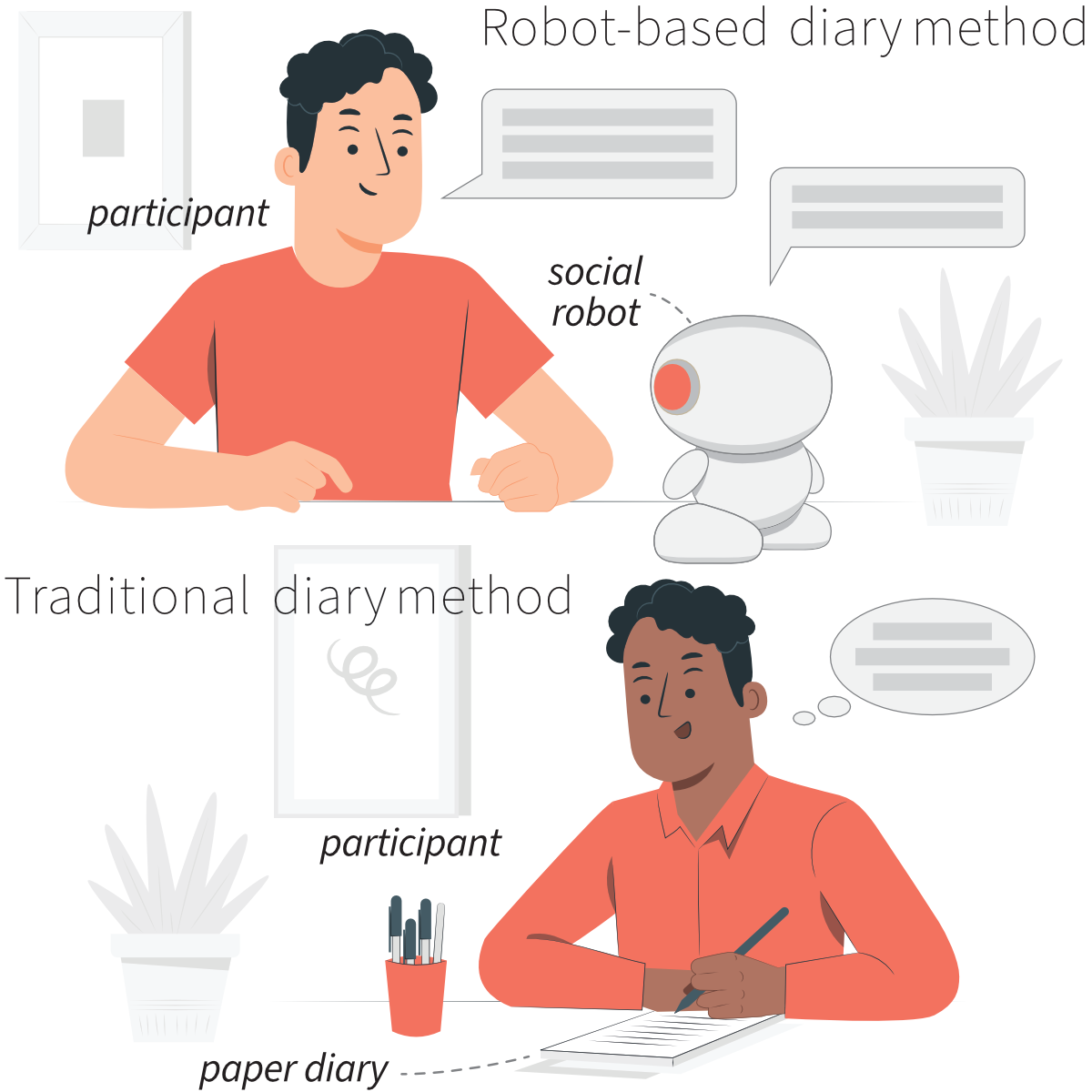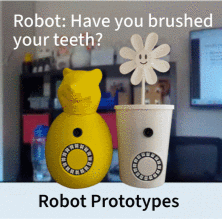publications
2025
-
 HRI 2025 25.0%Exploring the Use of Robots for Diary StudiesMichael F. Xu, and Bilge MutluIn Proceedings of the 20th ACM/IEEE International Conference on Human Robot Interaction (HRI), 2025
HRI 2025 25.0%Exploring the Use of Robots for Diary StudiesMichael F. Xu, and Bilge MutluIn Proceedings of the 20th ACM/IEEE International Conference on Human Robot Interaction (HRI), 2025As interest in studying in-the-wild human-robot interaction grows, there is a need for methods to collect data over time and in naturalistic or potentially private environments. HRI researchers have increasingly used the diary method for these studies, asking study participants to self-administer a structured data collection instrument, i.e., a diary, over a period of time. Although the diary method offers a unique window into settings that researchers may not have access to, they also lack the interactivity and probing that interview-based methods offer. In this paper, we explore a novel data collection method in which a robot plays the role of an interactive diary. We developed the Diary Robot system and performed in-home deployments for a week to evaluate the feasibility and effectiveness of this approach. Using traditional text-based and audio-based diaries as benchmarks, we found that robots are able to effectively elicit the intended information. We reflect on our findings, and describe scenarios where the utilization of robots in diary studies as a data collection instrument may be especially applicable.
@inproceedings{xu2025exploring, author = {Xu, Michael F. and Mutlu, Bilge}, booktitle = {Proceedings of the 20th ACM/IEEE International Conference on Human Robot Interaction (HRI)}, title = {Exploring the Use of Robots for Diary Studies}, year = {2025}, volume = {}, number = {}, pages = {174-182}, keywords = {Diary study;Social robots;Robots;Methods;Data collection}, doi = {10.1109/HRI61500.2025.10974118} } -
 HRI 2025 LBRDeveloping Robot Prototypes to Explore Robot-Facilitated Family RoutinesXinning He, Michael F. Xu, Bengisu Cagiltay, and Bilge MutluIn Proceedings of the 20th ACM/IEEE International Conference on Human Robot Interaction (HRI), 2025
HRI 2025 LBRDeveloping Robot Prototypes to Explore Robot-Facilitated Family RoutinesXinning He, Michael F. Xu, Bengisu Cagiltay, and Bilge MutluIn Proceedings of the 20th ACM/IEEE International Conference on Human Robot Interaction (HRI), 2025In this late-breaking report, we present our design process motivated to build tangible, cost-effective, child- and family-friendly social robot prototypes aimed to (1) support the practical needs of families, as well as (2) serve as a feasible research platform to mitigate technical and logistical challenges faced within conducting inhome HRI studies. We apply a research through design approach, combined with participatory design methods, to produce functional prototypes. In future work, we are preparing to continue improving prototype design by conducting (1) iterative co-design sessions with artists and product designers focusing on the hardware design, (2) iterative co-design sessions with families focusing on the interaction design, and (3) long-term technology probe studies in homes to evaluate the effectiveness of the technological platform. We aim to solicit feedback from the HRI community on our design process and prototype research platform.
@inproceedings{he2025developing, author = {He, Xinning and Xu, Michael F. and Cagiltay, Bengisu and Mutlu, Bilge}, booktitle = {Proceedings of the 20th ACM/IEEE International Conference on Human Robot Interaction (HRI)}, title = {Developing Robot Prototypes to Explore Robot-Facilitated Family Routines}, year = {2025}, volume = {}, number = {}, pages = {1342-1346}, keywords = {Family-robot interaction;Family-centered design;Social robots;Family routines}, doi = {10.1109/HRI61500.2025.10974104} }
2024
-
 RO-MAN 2024Robots in Family Routines: Development of and Initial Insights from the Family-Robot Routines InventoryMichael F. Xu, Bengisu Cagiltay, Joseph Michaelis, Sarah Sebo, and Bilge MutluIn 2024 33rd IEEE International Conference on Robot and Human Interactive Communication (ROMAN), 2024Finalist: Pioneering Research Award in Robot and Human Interactive Communication
RO-MAN 2024Robots in Family Routines: Development of and Initial Insights from the Family-Robot Routines InventoryMichael F. Xu, Bengisu Cagiltay, Joseph Michaelis, Sarah Sebo, and Bilge MutluIn 2024 33rd IEEE International Conference on Robot and Human Interactive Communication (ROMAN), 2024Finalist: Pioneering Research Award in Robot and Human Interactive CommunicationDespite advances in areas such as the personalization of robots, sustaining adoption of robots for long-term use in families remains a challenge. Recent studies have identified integrating robots into families’ routines and rituals as a promising approach to support long-term adoption. However, few studies explored the integration of robots into family routines and there is a gap in systematic measures to capture family preferences for robot integration. Building upon existing routine inventories, we developed Family-Robot Routines Inventory (FRRI), with 24 family routines and 24 child routine items, to capture parents’ attitudes toward and expectations from the integration of robotic technology into their family routines. Using this inventory, we collected data from 150 parents through an online survey. Our analysis indicates that parents had varying perceptions for the utility of integrating robots into their routines. For example, parents found robot integration to be more helpful in children’s individual routines, than to the collective routines of their families. We discuss the design implications of these preliminary findings, and how they may serve as a first step toward understanding the diverse challenges and demands of designing and integrating household robots for families.
@inproceedings{xu2024robots, author = {Xu, Michael F. and Cagiltay, Bengisu and Michaelis, Joseph and Sebo, Sarah and Mutlu, Bilge}, booktitle = {2024 33rd IEEE International Conference on Robot and Human Interactive Communication (ROMAN)}, title = {Robots in Family Routines: Development of and Initial Insights from the Family-Robot Routines Inventory}, year = {2024}, volume = {}, number = {}, pages = {1070-1077}, keywords = {Surveys;Systematics;Social robots;Buildings;Frequency estimation;Planning;Interviews;Robots}, doi = {10.1109/RO-MAN60168.2024.10731432} }